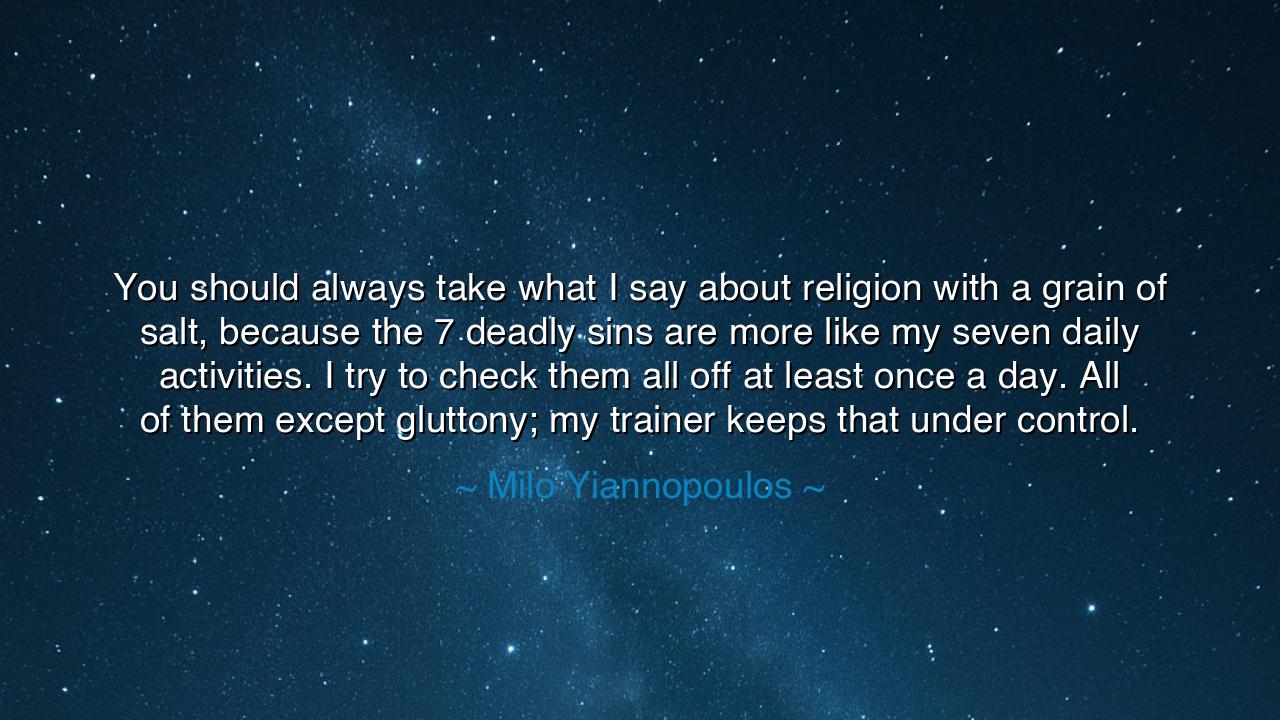
You should always take what I say about religion with a grain of
You should always take what I say about religion with a grain of salt, because the 7 deadly sins are more like my seven daily activities. I try to check them all off at least once a day. All of them except gluttony; my trainer keeps that under control.






Hear, O seekers of wisdom hidden in jest, the words of Milo Yiannopoulos, who declared: “You should always take what I say about religion with a grain of salt, because the 7 deadly sins are more like my seven daily activities. I try to check them all off at least once a day. All of them except gluttony; my trainer keeps that under control.” Though these words are wrapped in satire and irreverence, they reveal a deeper reflection on human frailty, hypocrisy, and the tension between moral law and human desire.
The origin of this saying rests in Milo’s persona as a provocateur, one who often cloaked truth in irony, and seriousness in humor. His declaration is not to be taken literally, but as a performance, reminding us of the ease with which humans slip into the very vices they condemn. By mocking the seven deadly sins, he calls attention to the universal truth that all people, whether devout or irreligious, are entangled in weakness. His jest, then, is both confession and accusation: confession of his own indulgence, and accusation of a society quick to judge others while quietly practicing the same.
Consider the seven deadly sins—pride, envy, wrath, lust, greed, sloth, and gluttony. They were once taught by the Church as the roots of all evil, the poisons that destroy the soul. Yet Milo, with tongue in cheek, describes them as daily activities, suggesting how ordinary they have become in the modern age. What was once condemned as vice is now marketed, celebrated, even envied. Pride is branded as self-confidence, envy fuels consumerism, wrath feeds public discourse, lust saturates entertainment, greed drives ambition, sloth hides in convenience, and gluttony lurks behind abundance. His joke, therefore, is a mirror: it shows how society itself has normalized the sins once feared.
History itself gives testimony. In ancient Rome, before its fall, indulgence in vice became a mark of power. Emperors such as Caligula and Nero flaunted excess, turning what once was shameful into public spectacle. Bread and circuses distracted the people, while the old virtues of discipline and restraint dissolved. The jest of Milo echoes this truth: when the sins become daily activities, a civilization risks forgetting the line between freedom and corruption. His humor is laughter with an edge, for behind the joke lies a warning.
And yet, notice the mention of gluttony, held in check by the trainer. Here lies another layer of irony: physical health is guarded, while spiritual health is neglected. This reflects the spirit of the age, where outward appearance is more carefully managed than inward character. A society obsessed with fitness may still be consumed by greed, lust, envy, and pride. In this small detail, Milo shows us how misplaced our priorities often are—flesh disciplined, spirit forgotten.
The meaning, then, is both humorous and sobering. On the surface, it is mockery of moral codes. Beneath the surface, it is recognition of how difficult it is to live free from vice, and how easily we justify our indulgences. His jest reveals that human beings, no matter how religious or secular, must grapple with the same frailties. It is easy to condemn others for sin, harder to confess our own.
The lesson for us is plain. Do not be deceived by appearances, nor pretend that you are free from weakness. Examine yourself honestly, for the seven deadly sins lurk in every soul. Do not excuse vice with humor alone, but let humor remind you of your own need for discipline and humility. And above all, remember that even jesters, through their mockery, can teach truths kings and priests forget.
Thus let Milo’s jest be heard not only as comedy, but as counsel: that the sins we condemn in others may be the very ones we practice daily, and that laughter should not only excuse us, but awaken us. For though the sins may tempt us all, the true strength lies not in denying our frailty, but in striving daily to master it.






AAdministratorAdministrator
Welcome, honored guests. Please leave a comment, we will respond soon